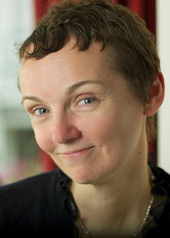How can the FDA change its view on drug approvals to give patients access to better therapies?
By Kelly Close
 We don’t have many public figures with type 1 diabetes and are willing to talk about it. Mary Tyler Moore has carried the banner for years; Nick Jonas, more recently. Halle Berry has some form of the disease, though she hasn’t really advanced public awareness. (In 2007, she was quoted as saying that she had cured herself of type 1 diabetes – “I’ve managed to wean myself off of insulin, so now I’d like to put myself in the type 2 category,” she said.)
We don’t have many public figures with type 1 diabetes and are willing to talk about it. Mary Tyler Moore has carried the banner for years; Nick Jonas, more recently. Halle Berry has some form of the disease, though she hasn’t really advanced public awareness. (In 2007, she was quoted as saying that she had cured herself of type 1 diabetes – “I’ve managed to wean myself off of insulin, so now I’d like to put myself in the type 2 category,” she said.)
My point is, the diabetes community, type 1 and type 2, has not been blessed with an abundance of high-profile spokespeople – which makes Supreme Court Justice Sonia Sotomayor’s memoir so refreshing. As described in Jim Hirsch’s excellent “logbook”, Sotomayor not only acknowledges that she has had type 1 since she was a young girl but she also writes movingly about its impact on her life. The book itself, My Beloved World, has been at the top of the best-seller list for weeks now, and I hope the justice continues to use her platform to draw attention to the diabetes and to inspire other patients by her example.
Earlier this month, in one of its most stunning decisions in recent memory, the FDA refused to approve Novo Nordisk’s new ultra-long-acting insulin degludec (Tresiba). This, despite a positive 8-4 vote by an FDA Advisory Committee, which usually augurs a drug’s approval. Instead, the FDA asked the company to conduct a large-scale cardiovascular outcomes trial to ensure that the drug does not pose excessive risk (see new now next in diaTribe #49 for more details). A cardiovascular outcomes trial will likely set back degludec’s approval in the United States by several years, even though other major regulatory agencies like those in the European Union and Japan have already approved the drug and, to boot, have given it a very favorable “label” (instructions for use). While we recognize the imperative of insulin safety, we would love to see the FDA reconsider how it balances the risks and benefits of new drugs and for them specifically to consider approving the drug “conditionally” for those with type 1 and those without any cardiovascular disease (for a start).
Degludec, per se is not the issue. For most people, it would likely be moderately more effective in reducing hypoglycemia and controlling blood glucose compared to insulins already on the market. That said, without degludec being approved first, Novo Nordisk cannot develop another insulin, IDegLira, which could be a breakthrough insulin/GLP-1 combination product. Without incremental changes, more meaningful changes become all the less likely.
Big picture, the broader issue of the FDA’s decision is the signal it has sent about drug development – and that could impair healthcare in America, not just diabetes. The agency has become so fearful of approving a drug it is not sure of, it has often become paralyzed, and we’ve already seen substantial delays for diabetes drugs, including alogliptin, vildagliptin, SGLT-2 inhibitors, and various obesity agents.
The repercussions are huge. We need companies to try bold new things in pursuit of the best possible treatments. But those efforts are costly, and companies won’t make the investments and assume the risks if they see the FDA as unpredictable at best, hostile at worst. As far as degludec is concerned, an industry giant like Novo Nordisk can finance a massive cardiovascular safety trial, which it plans to do, but the FDA’s decision threatens smaller companies and might prevent them from pursuing new and innovative diabetes drugs when there’s even the hint of safety risks for specific populations – and that’s just about every drug in development. What can we do? Sharing our opinions with the FDA and other government officials is one idea toward changing the current regulatory philosophy – for ideas on how to get involved, check out Kerri Sparling’s “Avenues for Patient Advocacy” in diaTribe #46 – but there’s also a purely practical consideration. The cardiovascular outcomes trial that Novo Nordisk will be undertaking will likely require a large number of participants, and simply finding enough volunteers will be difficult. I’d urge you to think about volunteering for such studies if you are comfortable doing so – since the trials are randomized and, in the case of insulin, will have a comparator insulin arm, there’s no guarantee you will be given the medication during the trial itself. However, every volunteer gets the drug that much closer to FDA approval.
Very best,

Kelly L. Close







